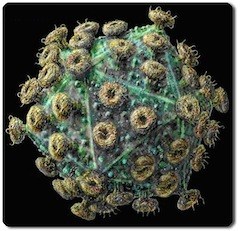 In 1981, the Centers for Disease Control and Prevention in Atlanta published a report saying that they had identified, without probable cause, five cases of a rare strain of pneumonia among men in Los Angeles. By the following July, this disease, now appearing in isolated pockets around the world, was given the name Acquired Immune Deficiency Syndrome or AIDS. Just two years later, proclaiming that we would soon be able to inoculate people against this disease, the United States Health and Human Services Secretary said, “yet another terrible disease is about to yield to patience, persistence and outright genius.” Almost twenty years later, we know a great deal more about the disease, but we still have no cure and no inoculation. Since its discovery AIDS has claimed over 25 million lives.
In 1981, the Centers for Disease Control and Prevention in Atlanta published a report saying that they had identified, without probable cause, five cases of a rare strain of pneumonia among men in Los Angeles. By the following July, this disease, now appearing in isolated pockets around the world, was given the name Acquired Immune Deficiency Syndrome or AIDS. Just two years later, proclaiming that we would soon be able to inoculate people against this disease, the United States Health and Human Services Secretary said, “yet another terrible disease is about to yield to patience, persistence and outright genius.” Almost twenty years later, we know a great deal more about the disease, but we still have no cure and no inoculation. Since its discovery AIDS has claimed over 25 million lives.
Yet AIDS has never killed anyone; not in the truest sense. As scientists researched AIDS in the months and years after its discovery, they came to see that it was not really a disease itself but was in fact a collection of symptoms and infections stemming from a common cause that they soon identified as what we now know as Human Immunodeficiency Virus or HIV.
But HIV does not kill people either. HIV is what is known as a retrovirus—a kind of virus that can insert its DNA into a host cell’s genome and then reside there indefinitely. Transferred through bodily fluids, HIV primarily attaches itself to important cells in the immune systems—cells that defend the body from infection and disease. As infection spreads to greater and greater numbers of certain types of these cells, the body becomes susceptible to infections, tumors and other life-threatening illnesses. Viruses, bacteria, parasites and fungi that a healthy immune system can easily defeat soon rage unchecked by the weakened immune system. Eventually most HIV patients develop what we know as AIDS. While it typically takes nine or ten years for HIV to become AIDS, a person with AIDS has a life expectancy of less than one year.
New and promising treatments continue to turn up, but the disease continues to develop resistance to these. What is at one time effective quickly becomes useless as the disease adapts to beat it. Once HIV becomes full-blown AIDS, most patients succumb quickly to lethal combinations of disease and infection. AIDS has a 100% mortality rate. It is an awful, horrific way to die.
Have you ever considered that spiritual discernment functions much as the church’s and the Christian’s immune system? The parallels are crystal clear. It is spiritual discernment that allows us to identify and overcome the disease of false doctrine and false gospels. Like the body’s immune system, discernment responds to “disease,” quickly identifying and destroying what is foreign.
What this means is that without discernment we are like a body without an immune system. We are a like church stricken with AIDS. We are helpless and hopeless; we will be destroyed. It is not the lack of spiritual discernment that will kill us, but the lack of protection that spiritual discernment offers–the kind of protection that allows us to filter truth from error and right from wrong.
And I guess this is the reason I wrote The Discipline of Spiritual Discernment way back in 2007. And it is why wherever I travel I find myself encouraging people to be deliberate in growing in spiritual maturity. The church is in need of discerners, of people who are mature and maturing in the faith, who are skilled in separating truth from error and right from wrong, and who can do it all holding fast to both truth and love. The church needs Christians like this who can protect her from the constant false gospels that rise up against her.










